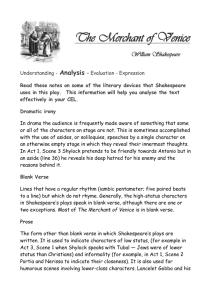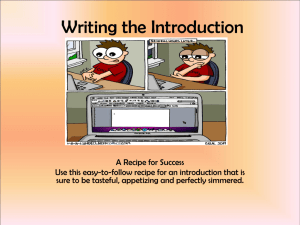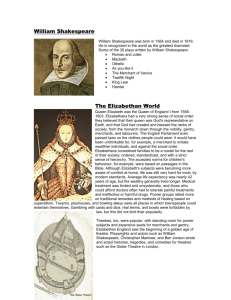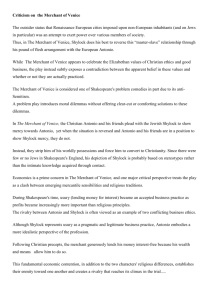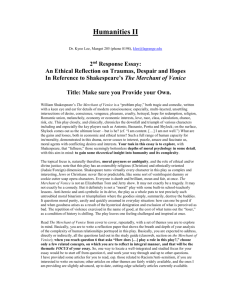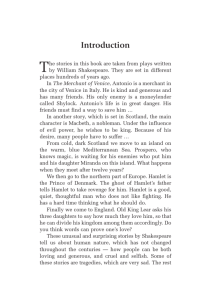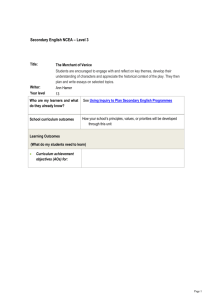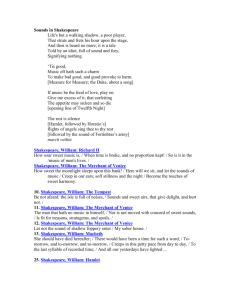ـــــــــــــــــــــــــــــــــــــــــــــــــــــــــــــــــــــــــــــــــــــــــــــــــــــــــــــــــــــ
advertisement
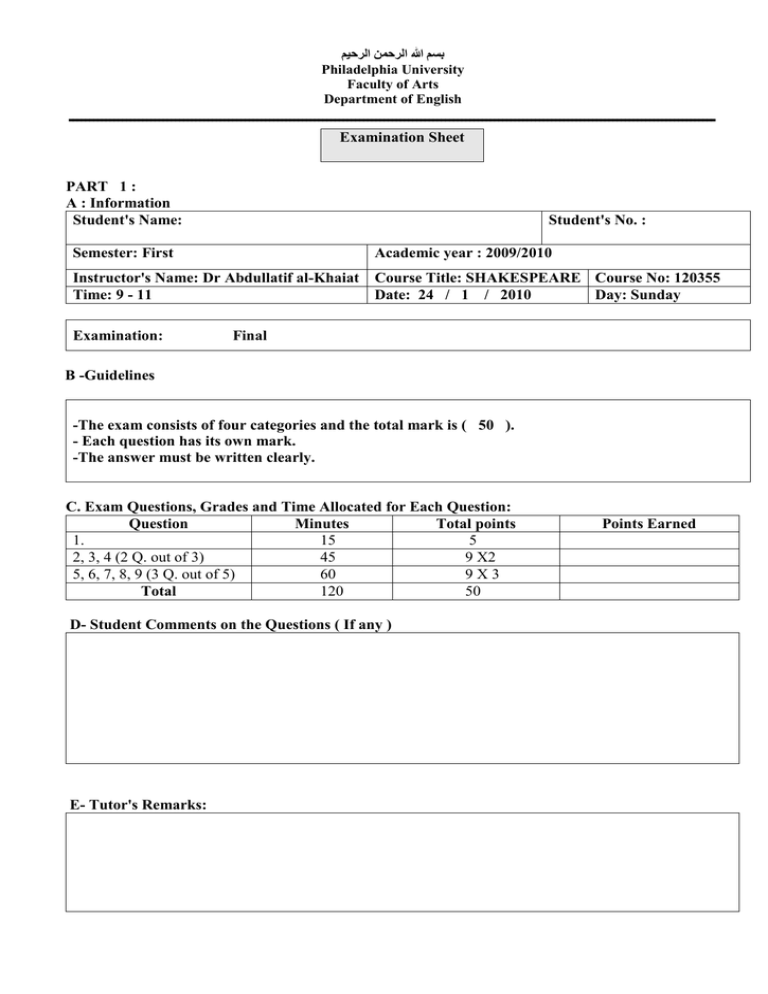
بسم هللا الرحمن الرحيم Philadelphia University Faculty of Arts Department of English ــــــــــــــــــــــــــــــــــــــــــــــــــــــــــــــــــــــــــــــــــــــــــــــــــــــــــــــــــــــــــــــــــــــــــــــــــــــــــــــ Examination Sheet PART 1 : A : Information Student's Name: Student's No. : Semester: First Academic year : 2009/2010 Instructor's Name: Dr Abdullatif al-Khaiat Time: 9 - 11 Course Title: SHAKESPEARE Course No: 120355 Date: 24 / 1 / 2010 Day: Sunday Examination: Final B -Guidelines -The exam consists of four categories and the total mark is ( 50 ). - Each question has its own mark. -The answer must be written clearly. C. Exam Questions, Grades and Time Allocated for Each Question: Question Minutes Total points 1. 15 5 2, 3, 4 (2 Q. out of 3) 45 9 X2 5, 6, 7, 8, 9 (3 Q. out of 5) 60 9X3 120 50 Total D- Student Comments on the Questions ( If any ) E- Tutor's Remarks: Points Earned PART II : Questions FIRST Category :Knowledge and Understanding The aim of these questions is to asses the basic knowledge and skills the student acquired. ANSWER QUESTION ONE: Q. (1) ANALYSE AND COMMENT ON THE FOLLOWING EXCERPT: Therefore the poet Did feign that Orpheus drew trees, stones, and floods, Since naught so stockfish, hard, and full of rage, But music for the time doth change his nature. 5 points [Lorenzo, V, 1, 79-82] ANSWER TWO OF THE FOLLOWING THREE QUESTIONS: 9 points each Q. (2) Are there any serious issues raised in The Merchant of Venice, or is it just for pure humour? Give some details. Q. (3) What abilities does Portia prove to have during the long trial scene? Give some details. Q. (4) Is Nerissa important in the play? Give your reasons. Second Category : (Cognitive and Analytical) The aim of these questions is to asses the students ability to recognize and analyze information. CHOOSE THREE OF THE FOLLOWING FIVE QUESTIONS: 9 points each Q. (5) Why do you think Shakespeare includes in The Merchant of Venice the love story of Jessica and Lorenzo? Q. (6) Discuss religion in the play of The Merchant of Venice. Q. (7) Does one feel from reading the play that he/she can imagine how life was in Venice at that time? Or is that of no particular interest to Shakespeare? Give some details. Q. (8) What types of humour do we have in The Merchant of Venice? Give some examples. Q. (9) Is it important for appreciating The Merchant of Venice to have some knowledge of The Bible and mythology? How? بسم هللا الرحمن الرحيم Philadelphia University Faculty of Arts Department of English ـــــــــــــــــــ ــــــــــــــــــــــــــــــــــــــــــــــــــــــــــــــــــــــــــــــــــــــــــــــــــــــــــــــــــــــــــــــــــــــ Model Answers and Marks Distribution Semester: First Academic year : 2009/2010 Instructor's Name : Dr. Al-Khaiat Course Title: Shakespeare Examination : Course No.: 120355 Final Model Answers : Questionَ Model Answer Components Lorenzo is saying: It is for the above reasons that Ovid the poet claimed that Orpheus caused by his music even the trees, stones and floods to follow him; that is because there is nothing in existence so insensitive or heartless but music will change its nature, even if for a short while. 1. This mythical story of Orpheus is an effective hyperbole to show the extreme effect of music. Using 'his' instead of 'its' is a personification to signify how those inanimate things will be moved like humans. This play does raise important issues. Although Shakespeare is careful to please and gratify his Christian audience, he does challenge their stereotyped image of the Jew. Shylock dos make a strong case for remembering that the Jews, like anybody else, suffer 2. pain, and have the same needs like others; and that they will revenge for the insults leveled at them. The Prince of Morocco and others draw attention to the merits of people outside Europe, and that may broaden the minds of the audience. It is not just rhetoric that Portia uses, although she has a lot of it. She shows that her knowledge of the law, and even of legal terminology, is extensive. She also has a plan, when she starts by urging Shylock to show mercy, and she speaks most effectively in this strain. When 3. he proves immune to any sympathy or pity, she first wins his confidence by showing great impartiality. But then she gives him several quick blows that leave him no option but to surrender. Mark 5 points 9 points x2 (2 Q. out of 3) Of course she is not as important as Portia or Shylock, but she is very useful and has several functions. She is Portia's personal maid, and to her Portia can speak like a friend; and she herself can make bold 4. suggestions, as when she arouses her mistress's interest in Bassanio. She does not need Portia's approval before she accepts Gratiano's proposal of marriage, or to quarrel with him about the ring. She is very useful as a legal assistant in court. They are not indispensable for the main plot of the play, but their story is a sub-plot that adds to the attraction of the play; their adventure is quite exciting, and we know more about the Jew from 5. his daughter, as she can no longer endure to live with him. Lorenzo himself is a very effective speaker about love, and he has some of the most excellent lines about the moon, about music, etc. Religious worship is almost never mentioned, although Portia claims (falsely) that she will be spending a long time with her maid in a monastery. People pray to God, and swear by God, but are not 6. particularly devoted. Religion is in this play mostly a refuge or a factor in uniting Christians against the Jews or the Jews against Christians. Shakespeare gives only the essentials of Venetian life for his practical purpose of people's responding to the play. We have some Italian words, like magnifico, and we know about the Rialto; we know that people used a gondola to cross the channels of Venice. We 7. also are told on several occasions, especially during the trial, of the laws of Venice, and why everybody needs to respect them. But on the whole, Shakespeare does not provide more than the most necessary information about that town. 8. Launcelot uses several types of humour: he uses puns, confuses words, muddles phrases; uses meaningless English or Latin phrases, and even shouts with incomprehensible sounds. All this may be counted as rather low humour. Portia uses much higher humour, and that is what is expected from a person like her, and of course Nerissa tries to vie with her mistress in this. Gratiano has some rough humour, and that accords with his character. We have other things, like the silly situation Shylock is exposed to while Tubal is playing with him with quick alternative news. One can of course get along without knowing the many mythical allusions, and allusions to the Bible, but one misses a lot in that case. The story of Laban and Jacob is very interesting, and the allusion to 9. Daniel is important. Lorenzo and Jessica show great familiarity with mythical legends and myths. It is obvious that Shakespeare expected his audience to appreciate all that, because such allusions are quite numerous; and one misses much without such knowledge. Day & Date: Sunday 24/1/2010 Course Instructor: Dr. Abdullatif al-Khaiat Signature: 9 points X 3 (3 Q. out of 5)
